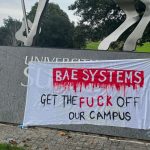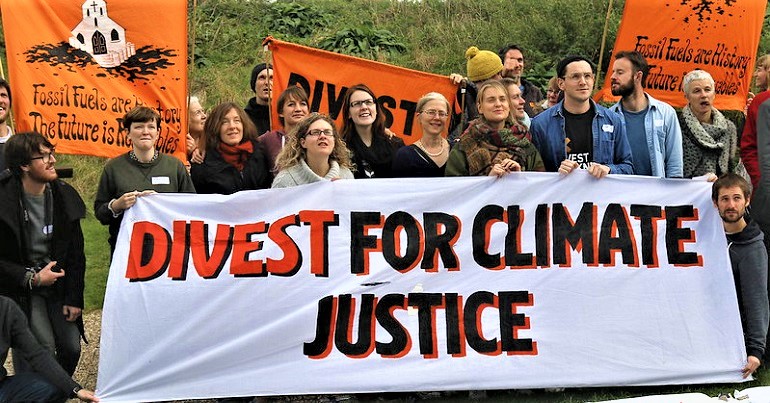Why we disrupted Tony Hayward's award at the University of Birmingham
by Tom Wragg
I was part of a group of students who disrupted the talk Tony Hayward gave at Birmingham this week. Tony Hayward has a record of disgraceful actions in several companies that mean he should never be allowed to give a scripted performance as a so called ‘distinguished leader’, especially not on the 10th anniversary of the Iraq war. Student after student, including people we had never met, stood up, interrupted and attacked him before being removed by security. His list of offenses is so long that despite people attacking him for about an hour we did not have time to mention everything.
Tony Hayward first came to prominence as an executive of BP. Papers released in 2011 have shown that BP, with Hayward in a senior position, actively lobbied for the war in Iraq through Baroness Simmons, the then trade minister. They were worried about being “locked out” of Iraq’s huge oil fields if Britain didn’t support the US in the war. A minister from the foreign office reassured them stating that “We were determined to get a fair slice of the action for UK companies in a post-Saddam Iraq.”
Tony Hayward was the CEO of BP from 2007 until he was pushed out in 2010 for his lack of concern for safety and poor management of the Gulf of Mexico Oil Spill. He was regularly referred to US media as “the most hated and most clueless man in America”, and was even personally attacked by Barack Obama. In a US congressional hearing those speaking from both sides of the house pointed to Hayward’s cost cutting policies as explanations for the spill.
Much of Hayward’s talk was about the importance and the necessity of taking risks. However, as was eloquently pointed out by the father of one of the workers who died in the BP rig blow out, he does not take risks with his own lives but the lives of others. It was not Tony Hayward who died when the rig exploded or his communities that were destroyed by pollution.
Since leaving BP Tony Hayward has been appointed as the senior independent director of Glencore, one of the world’s biggest mining companies. Glencore controls 50 per cent of the global copper market, 60 per cent of zinc, 38 per cent in alumina, 28 per cent of thermal coal, 45 per cent of lead and almost 10 per cent of the world’s wheat. They use their monopolistic positions in these markets to manipulate prices getting themselves huge profits while causing poverty, starvation and chaos around the world.
A Swiss NGO has said that even compared to the bad bunch that is mining companies “Glencore is still in the dark ages”. In the Congo they were found to be profiting from child labour in 150 foot deep hand dug copper mines, and were releasing a waterfall of raw acid into a river killing all the life inside it and damaging all the communities around the river. In Columbia they were found to have paid paramilitary organisations to massacre and drive people from their land in order to make way for mining.
The only thing that Hayward said about his involvement in Glencore was that the company was not involved in the production or sale of grain, simply in moving it around, therefore that it doesn’t affect the price. This is nonsense: commodity trading is widely held to cause food and other commodity price spikes, and the huge proportion of the world market owned by Glencore means that they are effectively price setters. Other than this Hayward refused to talk about his role in Glencore, dodging questions about the company and his involvement in it. He clearly was not inclined to defend the indefensible.
Hayward is now the CEO of Genel Energy, an Anglo-Turkish gas and oil giant, steering the company to become heavily involved in the politically volatile exploitation of oil fields in the Kurdistan Region of Iraq.The conflict between energy companies like BP and Genel Energy in the region is fueling tension between the Iraqi federal government and the semi-autonomous Kurdistan Regional Government. Genel is in the process of lobbying for a direct pipeline to transport crude oil directly to Turkey, in order to bypass the Iraqi federal government and boost production rates to benefit Western energy security, while BP is standing on the opposite side of this divide. Hayward appears unfazed by the political damage caused to the nation, alluding in an interview with Bloomberg in November 2012, to potential “political unrest” pushing up the price of crude oil to well above a base line of $100, thereby generating profits and increasing share prices of many of the companies he’s involved in.
People have raised the criticism that we, through this action, have violated Tony Hayward’s right to free speech. However this uses a concept of free speech that ignores the realities of the world and becomes a defence of the powerful, providing them with a platform to air their views unopposed, rather than free speech’s intended purpose of defending challenges to them. A person who thinks that it is Tony Hayward’s right to lobby for a war that permanently silences hundreds of thousands of people, but that it is not the right of protesters to interrupt him, has their priorities fatally wrong. Free speech is about protecting ideas and concepts that do not get expressed very often in the public sphere; not about stopping ideas and concepts that are continually expressed in the media and public sphere from ever being challenged. If there is someone whose free speech needs protecting, it is those that want to speak against the interests of rampant devastating greed not in favour of it.
Hayward mentioned in his speech that he was hoping (in vain) that this was going to be the first time he had spoken in a while without protesters interrupting him. For what he has done and been involved in, never letting him speak without interruptions is the least we can do.
Tom Wragg is Vice President Democracy and Resources elect of the Birmingham Guild (Student’s Union) and a member of the People & Planet Management Committee.




Do this by alternating between standing on the balls of your feet and your heels.
To begin the decision making process the best place to
begin and shop for the perfect treadmill is online. With Motoblur, Motorola tried to bring the social experience to the foreground.
Feel free to surf to my webpage best treadmills 2014
This cheered me up, been wanting this to happen to him ever since he came to the Edinburgh Book Festival to give a talk on surviving crises (or similarly self-serving pish).